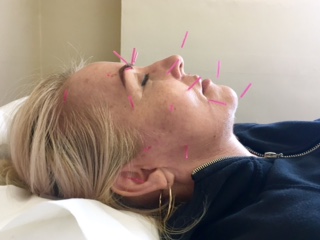What is Acupuncture?
Acupuncture is a complementary therapy that involves the insertion of fine needles into the skin at specific points on the body.
Traditional acupuncture is a holistic healthcare system that regards pain and illness, whether physical or mental, to be a sign that the body is out of balance. Because traditional acupuncture considers every bodily function to be connected and interdependent, it recognises the role emotions play in illness and disease. The overall aim of treatment is to restore the body balance.
Traditional acupuncture treats the whole person, body and mind, and not just the symptoms. It’s been researched, refined and developed for centuries and is now widely used and accepted all over the world.
Acupuncture is part of an ancient and sophisticated form of medical treatment which originated in China, but has increasingly spread throughout the world.

What does Acupuncture involve?
Acupuncture involves the insertion of extremely fine, hair-like, pre-sterilized, stainless steel needles at pre-determined points on the body surface (known as acupuncture points) to restore internal health. In the hands of a fully qualified professional practitioner the use of acupuncture is entirely safe and free of any harmful side-effects.
It has stood the test of time over several thousands of years and has not been found wanting.
How can Acupuncture help
Acupuncture, when performed properly, can bring the body into balance and assist the healing process through the regulation of qi – energy, blood and fluid in the body.
Acupuncture removes blockages; stimulates the immune system; harmonises emotion; improves blood flow; reduces pain and inflammation and stimulates healing in the body’s tissues. It is used to treat a range of conditions, such as lower back pain, infertility and depression, and to prevent illness, aid recovery and promote general well being.
Acupuncture is not widely available through the NHS and most clients pay for their treatment.

What can be treated?
Many conditions can be treated successfully by acupuncture.
Conditions
- Anxiety
- Osteoarthritis
- Frozen shoulder
- Lower back pain
- Neck Pain
- Sciatica
- Sports Injuries
- Tennis Elbow
- Cancer Relief
Brain and Nervous System
- Dizziness and Vertigo
- Migraines
- Multiple Sclerosis Stroke
Digestive System
- IBS
- Abdominal Pain
- Colitis
- Gastritis Indigestion
- Constipation
- Diarrhoea
Ear, Nose and Throat
- Anxiety
- Osteoarthritis
- Frozen shoulder
- Lower back pain
- Neck Pain
- Sciatica
- Sports Injuries
- Tennis Elbow
- Cancer Relief
- Allergies
Auto Immune Disorders
- Chronic Fatigue Syndrome
Eyes and Vision
- Eye disorders
Heart and Circulation Lungs and Breathing
- Asthma Lung and respiratory related
Mental Health and Behaviour
- Addictions
- Anxiety
- Depression
- Grief
- Insomnia
- Panic Attacks
- Poor concentration
- Poor memory
Head, Mouth and Teeth
- Bells’ Palsy
- Headache
- TMJ
- Trigeminal
- Neuralgia
Women’s Health
- Gynaecological Issues
- Irregular Menstruation
- PMS Menopause
- Male and Female fertility – Pre and post IVF.
- Morning Sickness Breech Presentation
Facial Rejuvenation Acupuncture
- This unique treatment can help:
- Increase collagen and elastin
- Reduce facial lines and wrinkles
- Restore a youthful glow to your complexion A safe, natural approach to looking younger
Acupuncture FAQs
This depends on each individual case. Responses to treatment do vary from person to person and will depend on the nature of the condition being treated. Many people with acute conditions experience a real improvement in symptoms very quickly.
For people with longer term and more complex cases change can be more subtle and usually require more treatment over a longer period of time. Initially most patients attend for acupuncture on a weekly basis. As symptoms improve so the interval between treatments is extended.
Most people notice some improvement after 2-4 treatments. Progress and frequency of appointments is regularly reviewed at each treatment.
Acupuncture needles are extremely fine and very different to the needles used when, for example, having blood taken. When an acupuncture needle is inserted some people can feel a tiny pin prick. The sensation patients do feel when the acupuncture point is reached is usually described as a dull ache or tingling sensation followed by a feeling of relaxation.
Licensed acupuncturists are required to work within clear standards relating to hygiene and safety thus providing protection against the transmission of infectious diseases. The acupuncture needles used in treatment are pre-sterilised, single use and disposable.
After treatment some patients can feel a bit sleepy or light headed but some patients report that they feel more relaxed and have more energy. Very occasionally a bruise can appear at the site where the acupuncture needle was inserted but this will disappear after a few days.
If you are receiving treatment from your doctor then it can be helpful to let them know about any acupuncture treatment you plan to have. Acupuncture is increasingly recognised as being an effective complementary therapy alongside conventional medical treatment and an excellent treatment option for a whole range of conditions.
Before treatment begins the acupuncturist takes a detailed Medical History to access your suitability for acupuncture. You should provide details of any medication you are taking and also advise if you have a pacemaker or other electrical implant.
If you have any other questions about acupuncture Ros will be very happy to answer them. Please visit the contact page.